In 2017, Donald Trump stood at the lectern to speak at his inauguration promising wealth and prosperity and to rid "American carnage" from US cities.
"For many decades, we've enriched foreign industry at the expense of American industry," he told the world, as concerns about tariffs and trade in world capitals grew.
Those concerns were felt not least in Dublin, where the Irish tax base has long been underpinned by American multinationals.
The changes the Trump administration made during that first term did not result in the damage to the Irish economy some feared.
Yet this time, the concerns are similar, but there are some reasons to fear the outcome could be different.
As he campaigned for re-election over the last year, Mr Trump repeated his mantra of economic protectionism. "We're going to bring thousands and thousands of businesses, and trillions of dollars in wealth back to the good old USA," he told supporters.
This time around his team seems more unified and better armed with knowledge of how to achieve their objectives based on lessons learned during the first Trump term in office.
If the second season of the Trump show is more about action than words, Ireland is uniquely exposed.
Here, in recent years we have had a budget surplus - a rarity in the European Union - as well as record growth, while the value of goods Ireland sells to the United States is well above what we buy from them.
Large volumes of corporation tax are also based on a few, often US multinationals.
Sectoral concerns
In 2023, the €54 billion of exports to America was concentrated in the pharmaceutical, medical and chemical sectors, which between them make up more than three quarters of our total sales to the US.
The US president-elect has had Irish-based US pharmaceuticals in particular in his crosshairs for years. "You look at Ireland, they make our drugs. Everybody makes our drugs except us," he told Fox News in 2020.
So if he was to take on those companies this time around, how would it work?
Former head of Research and Development at Pfizer, John LaMattina, told Prime Time the threat of companies' moving Irish operations to the US is not as great as the risk to future expansion.
"Pfizer is not going to try and recreate Ireland in South Carolina or any place in the United States. It just doesn't have the money and funds to do that," he said.
Instead, he says, companies planning expansions will be encouraged to locate those facilities in the US.
"I think that's more likely to happen as opposed to Pfizer expanding in Ireland or elsewhere. I think the first inclination would be, 'can we do this in the US? And if so, where?’"
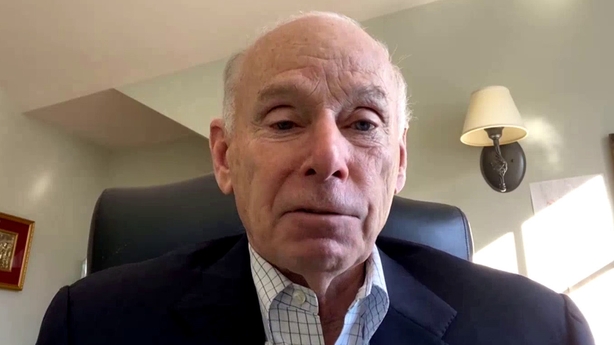
Donald Trump imposed some tariffs during his first term in office, including levies of up to 25% on global metals and a variety of products from China. This time around he is threatening similarly high tariffs on all goods from Mexico and Canada, and increasing the burden on Chinese importers.
Crucially, he has also threatened to introduce a 10% levy globally on all goods. Clearly, that would impact Ireland.
However, according to Everett Eissenstat, a trade advisor in the first Trump administration, that figure is more likely a negotiating start-point than a likely outcome.
"We'll see two percent, maybe going to three or four percent," he says, "possibly sectoral tariffs or maybe it will be a guide post for consultations, [but] keep in mind there will be opportunities for dialogue."
Whatever happens, Ireland will not be immune to the impact of Trump’s approach, Mr Eissenstat, who is now a partner at Washington law firm Squire Patton Boggs, said.
"To the President's mind, the trade deficit with Ireland is a big problem. It's a metric of unfairness," he said.
Mr Eissenstat notes that protectionist policies are not currently unique to a Trump administration, or the United States.
"We're in a very different world now, and there’s a shift towards a national economic security model using all tools of economic security, not just tariffs, but sanctions, export controls and investment reviews."
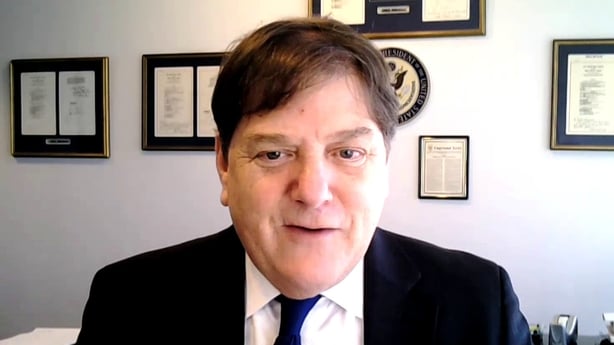
The view from Ireland
Rural Monaghan may be a world away from Washington DC, but there Martin McVicar will be watching Mr Trump’s speech on Monday just as closely as John LaMattina and Everett Eissenstat.
Mr McVicar is the co-founder of Combilift, a forklift manufacturer which employs 800 people and exports 30% of the products it manufactures to the US. It had €500 million in revenue last year.
"The US market is vital for our business," Mr McVicar told Prime Time, yet he does not share the gloomy outlook some in Ireland have ahead of Trump Term Two.
"There's a more positive business sentiment in the US today than there was in early November, he said, "we've seen that with our order intake over the last few months, and the amount of enquiries."
A firm in Texas placed an order worth €2m last month, he said. "They are confident for the next four years for their business. Otherwise, they wouldn't have placed that order, Mr McVicar added.
"I personally believe that Trump's bark is worse than his bite. I think if tariffs do come into effect, it'll be very much focused on Chinese products."
Irish diplomatic efforts will be focused on trying to ensure Mr McVicar is correct.
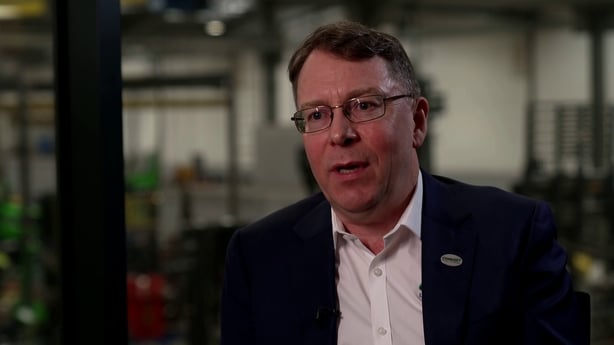
Embassy views
Ireland has an embassy in Washington and nine consulates general across the US. Staffing has increased by 35% in recent years, as part of the Global Ireland 2025 initiative. Despite that, one former member of the Trump administration says there’s work to be done.
"The cosiness to which they sidled up to the Biden administration has not gone unnoticed," said former Trump White House press secretary Sean Spicer.
"I don't even know who the current ambassador is," Mr Spicer added.
"I can tell you a number of senior Trump administration officials have reached out to me and said, ‘you're not alone on that.’"
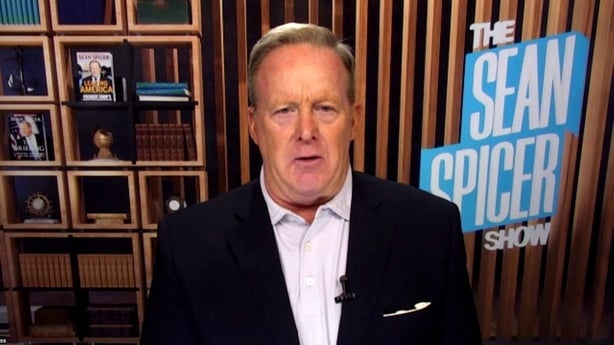
There is a strong pushback to criticism of the Irish mission from within diplomatic circles. Relationships across the aisle are very good, Irish officials insist.
Ambassador Geraldine Byrne Nason attended the Republican National Convention in August, and the embassy hosted events that included Trump associates, including Kellyanne Conway, in recent months.
Demographic declines
Yet the scale of the challenge cannot be underestimated, according to Trina Vargo, founder of the US Ireland Alliance. She said changing demographics have led to a decline in Irish-American relations.
"There are just fewer people who relate to being Irish-American. That whole generation of Ted Kennedy's, Tip O'Neill's, that's all gone," she said.
"It's great to have St Patrick's Day, it's great to have the shamrocks, but for me, it's all about convergence when it comes to actually delivering something in the relationship, [and] I think it's declined massively," she said.
"At the visit to mark the Good Friday Agreement we argued that President Biden could have announced his administration was endowing the George J. Mitchell scholarship programme, but he didn't" Ms Vargo noted, "a month later, he came back to the US and he and the President of South Korea announced $60 million in scholarship exchanges with South Korea."
"So the money's there, but the interest isn't," she added.
Ms Vargo said US presidential administrations are pivoting towards Asia, and partly for that reason, Ireland needs to make more friends in Congress.
"You have Richard Neal and Nancy Pelosi. When you get beyond that, you don't have chairmen of all these committees who you can just easily call up and say, can you help us sort that?"
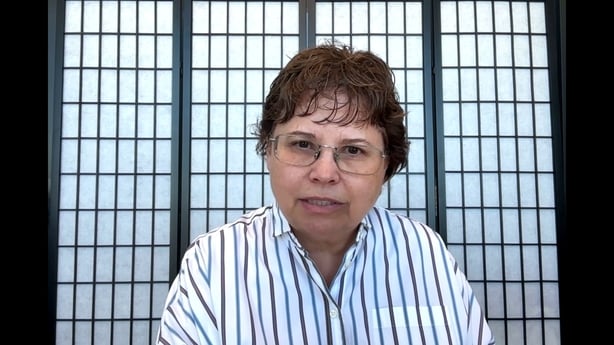
For former Trump trade adviser, Everett Eissenstat, what will be key for Ireland is finding policy alignments with the incoming administration to help in wider trade negotiations.
"The reputation, the affinity towards Ireland is very, very strong," he said, "there's a lot of good dynamics between our economies and our cultures and the way we see the world. That's not going to go away," he said.
Promises and prose versus priorities
Overall, it remains to be seen if the president-elect can afford the measures he is promising. Corporation tax cuts at home come at a cost, and US consumers could ultimately end up carrying the burden of any trade tariffs.
Regardless, we will have a clearer indication soon, says Sean Spicer.
"Carve out the entire afternoon of January 20th, carve out the 21st, because the number of executive actions that this president will sign, I think, will be historic."
So will the actions will match the rhetoric? Trina Vargo is skeptical.
"I have watched numerous people run for president of this country, Democrat and Republican, who always say, ‘we're going to get those jobs back home,’" she said.
"Maybe Trump can. But I've heard this before."
A report from Louise Byrne and Tara Peterman on what a Donald Trump presidency will mean for the Irish economy is broadcast on the 16 January edition of Prime Time at 9.35pm on RTÉ One television and the RTÉ Player.






